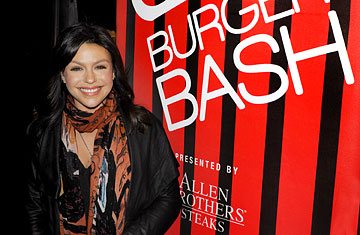
Chef Rachael Ray hosts the Amstel Light Burger Bash at the Ritz-Carlton South Beach on Feb. 25 in Miami
Every year Rachael Ray hosts a Burger Bash at the South Beach and New York Wine and Food Festivals. We caught up with Rachael at the Miami event to ask her a few questions about hamburgers, American tastes and how things have changed under her watch.
I want to start by paying you a compliment. I think that right now you could be said to personify home cooking in 2010. You are what Fannie Farmer or Betty Crocker or James Beard was to Americans in the past. Or, I guess Betty Crocker is imaginary. But you're in that line.
That's a huge compliment!
So you're a good person to ask, especially here at this event, in terms of American cooking, how have things changed over the last 10 years? How is the stuff you do now different from 10 years ago?
Things are really changing. Ten years ago people wanted dishes in their arsenal that they can slap on the table in a couple of minutes; now they're not afraid to try something that has a long list of ingredients, some of which might be new to them, because they're available now on a wide basis, at a fair price, at a lot of markets all over the country — instead of just to a few people at big cities. So I think that home cooking has evolved over the last few years for sure.
It's true. In your own part of the country, in upstate New York, you can go into a Wegmans and there's Ligurian olive oil and bialys and everything.
And there are more and more markets like that now!
So can you do recipes that are a little more complicated or exotic without spooking somebody?
You know what? The biggest difference isn't exotic stuff. It's the old-school grandmother cooking. People 10 years ago often had really minimal skills; there had been two generations of double-income earners not working from the home who where like, O.K., I'm going to try to cook a piece of boneless skinless chicken breasts, and I don't want to know from nothing else! You know? Now you can do the stuff that would take them all day on a Sunday, the more complicated sauce, the dried mushrooms versus fresh white button ones. The biggest difference is they'll put the time in. They'll try anything now, they're more confident, because we've been amateur cooks now for a generation. They're like, I can do that. I can handle that. I'm willing to try that.
Now, Rachael, you know that any discussion of American foodways comes back around, for me, to the subject of our great national food, the hamburger, which is after all what brings us all here today.
I don't think I have enough words to declare my love for the burger. I know you always take pains to say hamburgers because you're a purist. But I think you can make anything you want into a burger. I love tuna burgers, veal burgers, beef burgers. [Laughs.]
And in fact your position has won out! The priggish, puritanical, blue-nosed, mandarin, snotty point of view that I represent has been utterly discredited, while the burger has come to accommodate a vast scope not just of proteins but of ethnicities and flavors and different sectors of society.
Accessibility is just such a great thing. If everybody that looks at your product feels that they can join in and be a part of it, that's great. That's how I look at it. So for any great chef to put his or her favorite flavors between a bun, that just makes all these great chefs at this festival accessible to everyone. It makes any type of food or flavor accessible to all of us. It levels the playing field; it makes us all the same. That's what I like about the burger.
